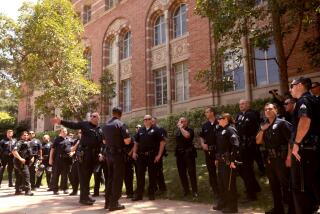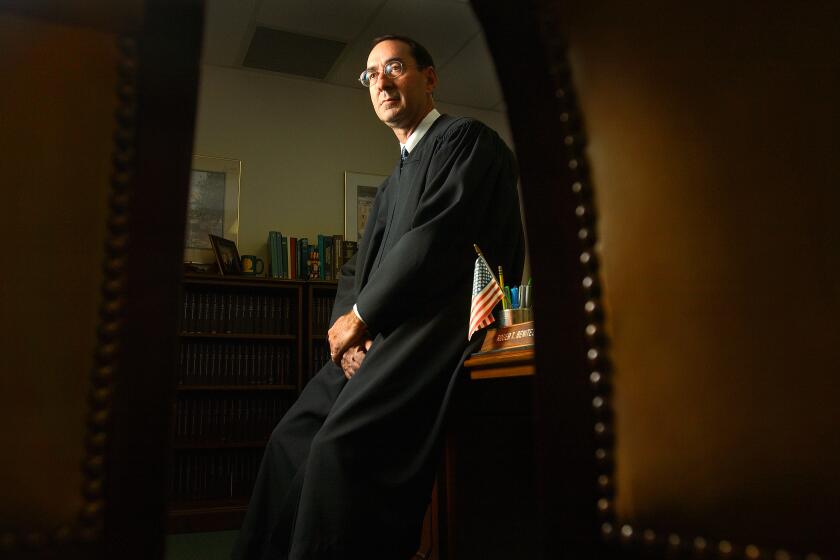Reject Pact in Suit Over Bank Fees, Lawyer Asks Judge
Attorneys asked a judge here Tuesday to reject a proposed multimillion-dollar agreement to settle a landmark legal challenge accusing two California banks of charging excessive fees for bounced checks.
Stephen David Kaus, an attorney representing plaintiffs in the case who oppose the settlement, said the agreement would actually benefit the banks more than consumers.
Among other things, he said, the proposal would permit the banks to raise to $15 or more their charge for processing bad checks--contrasted with the $6 charge that sparked the lawsuits in the first place.
“For Mr. and Ms. Public, this settlement offers nothing. . . ,” Kaus said at a jam-packed hearing before Superior Court Judge Isabella Horton Grant. “It should be rejected as a 14-karat fake.”
But attorney David B. Baum, representing other plaintiffs in the case, said the settlement is worth more than $100 million in benefits and added services for bank customers and urged its approval without further delay.
“The banks have been pushed as far as they could go, and the plaintiffs have achieved as much as they could,” Baum said. “On the balance, this is an important landmark settlement of great value to the public.”
The exchange between the two lawyers--among the two dozen attorneys sitting in the courtroom--came as Judge Grant began what are expected to be days of argument and testimony over the controversial proposal to settle the case. No ruling is expected until at least next week.
The outcome could affect more than 4 million customers of Wells Fargo and Crocker National banks, the two defendants in the case.
The dispute arose in 1978 with the filing of two class-action lawsuits against Crocker, which later was acquired by Wells Fargo.
The plaintiffs claim that Crocker was charging a $6 fee for processing bad checks when the actual cost was less than $1--and that the bank was making an unreasonably high profit off its customers.
The suits were dismissed in Superior Court, but eventually the state Supreme Court, in a milestone decision issued July 18, 1985, ruled unanimously that customers could bring suit to attack what they believed to be “unconscionable” fees.
The justices did not themselves conclude that fees were too high but instead sent the case back to Superior Court for trial. Lawyers for the plaintiffs and the banks entered into negotiations to try to reach an out-of-court settlement. And last fall, attorneys announced a complex and wide-ranging agreement that they said would provide bank customers with up to $117 million in benefits.
But a number of plaintiffs, led by Ralph Santiago Abascal, a lawyer for California Rural Legal Assistance, objected strenuously to the proposed agreement. Not only were they dismayed by the $3.65 million they said was set aside for attorneys’ fees, but also by a provision allowing the banks to raise the disputed bounced-check fee to $15 this summer or even higher in the future.
‘Lawyers Rich, You Get Zilch!’
Abascal enlisted consumer advocate Ralph Nader in the cause and, earlier this month, the two placed protest ads in local newspapers, headlined, “The Banks Get Off, the Lawyers Get Rich and You Get Zilch!”
The advertisements carried coupons that bank customers could clip and mail to the judge registering their objection to the proposed settlement. Court aides reported receiving hundreds of coupons and other handwritten protests--and the new state controller, Gray Davis, added his name to the list, saying the agreement is “not in the best interest” of consumers or the state of California.
The protesting plaintiffs are also objecting to a provision that requires customers to produce bank records back to 1973 in order to claim a 30% refund on bad-check fees.
Lawyers for the banks and other plaintiffs in the case say the settlement will provide a wide range of benefits to consumers. The settlement, they say, permits customers to win fair compensation without undergoing the cost and risks of a jury trial on the issue.
Among other things, the agreement would allow customers to receive a free year’s service--worth $18--on a credit card with overdraft protection or on an account with overdraft protection that automatically covers checks that exceed the account balance.
Other provisions would bar fees for the first check that bounces, as well as for any such check that comes within $10 of the balance in a checking account.
Under the agreement, the banks admit no wrongdoing.
Objectors to the settlement say the credit card provision of the agreement actually is a “marketing ploy” that will enable the banks to obtain more customers and profit from them in the long run. After one-year free service, they say, customers will be required to pay the normal $18-a-year service fee, plus normal finance charges on outstanding balances.
In Tuesday’s hearing, Weyman I. Lundquist, an attorney representing the banks, said that trying simply to refund fees to countless present and former customers over the years would have presented a procedural “morass” and that taking the issue to trial would have resulted in appeals lasting “into the next decade.”
More to Read
Start your day right
Sign up for Essential California for news, features and recommendations from the L.A. Times and beyond in your inbox six days a week.
You may occasionally receive promotional content from the Los Angeles Times.






